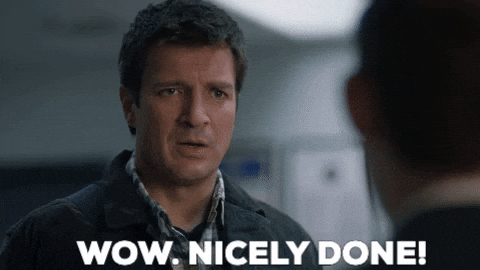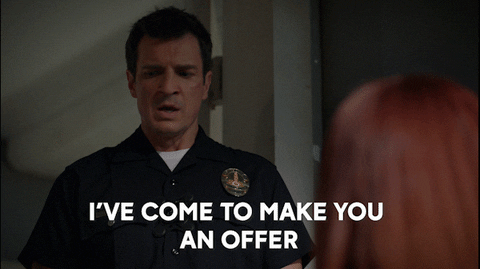- Jo & Lyndon's Newsletter
- Posts
- The Rookie mindset to new skills
The Rookie mindset to new skills
3 things The Rookie TV show challenged me to think differently about learning a new skill
In the past week, I’ve watched the entire first season of The Rookie (and part of the second).
Turns out that’s roughly 18 hours of my life that I’ll never get back…
But it did get me thinking about what I (and you) can learn about learning a new skill from a tv show about someone (actor Nathan Fillian of both Castle and Firefly) in their mid 40s trying to make a big change and get good at something completely new (being a police officer in LA).
Here’s the 3 things I’ve learned about mastering a new thing from binging The Rookie:

Gif by abcnetwork on Giphy
1. Learn from the person ahead of you
In sports, a rookie is someone in their first year. In (this TV show) a police rookie is a much more strictly defined term. A rookie is still someone in their first year, but they work with a Training Officer every day to learn on the job as they experience everything “in the real world” for the first time outside of a classroom.
When you think about learning something new, there are three main ways people learn:
Conceptual learning: read it in a book, attend a class, go to a workshop, etc
Observational learning: watching someone else do the thing, and break down how it worked (or didn’t) - case study learning is a form of this (as lyndon defines it..)
Experiential learning: doing something yourself
For things that are straightforward and clearly defined, conceptual learning is enough (eg Ikea believes putting together their furniture is conceptually understandable with the included hieroglyphics). As soon as you start adding unknowns or required experience to a new skill, finding someone to guide you through the experiential process becomes invaluable.
If I’m an entrepreneur how do I find a person ahead of me to learn from?
Think about your family or friend group - is there someone you look up to that you can buy a coffee and pick their brain about how they built their skills? In Never Enough author Andrew Wilkins describes how as a kid he would go over to his rich friend’s houses and ask their parents a bunch of questions because he was trying to figure out what made them successful while his parents were struggling.
Get a part-time job that will fast-track your skill development while you’re taught by your boss to be much better. Lots of photographers start as second shooters for weddings as they’re building their skills before selling their own wedding packages. This can work for design, web development, sales, and more - think of it as getting paid to learn.
Finding a coach that can give you focused feedback to improve rapidly. This costs money, but unlike mentorship or getting a job, since you’re paying money you can be laser-focused on what you’re learning and who the best person to teach you is.

Gif by abcnetwork on Giphy
2. Bring what you already know to your new skill
In the early episodes, the watch commander made it his mission to make Nolan (Nathan Fillion) wash out of the rookie program because “it’s harder to make old people unlearn everything they know compared to a young rookie who doesn’t know anything yet” (paraphrased).
As someone in his 40s with a 20-year-old son and being recently divorced, Nolan isn’t like the rest of the rookies. But within a few episodes he “learns” that bringing his previous experience to being a police officer enables him to connect with people better, understand criminals’ motivations, and trust his intuition to pick up things that are out of place.
Learning a new skill is very similar, tap into your previous experience to make you better at what you’re learning.
For example last month we rolled out a bunch of updates to our website (new layouts, new packages, updated navigations, etc), and I did most of the changes myself. I’ve never done any classes or tutorials on web development. But within about 30 minutes of making changes to our website, I realized that Showit’s no-code drag-and-drop design tools worked almost exactly the same way that PowerPoint worked for designing. Having spent 2 years of my life in a graduate business program I can proudly(🤔?) say I’ve made slides with hundreds of elements on them to visually tell a story I was presenting.
By tying those two skills together in my mind the learning curve of updating our website went from a whole new skill to just figuring out where the buttons were to do what I wanted to do.
The easiest ways of doing this:
Do you already know how to do something similar? Translate the new skill into terms you already understand, when learning a new language most people still “think” in their native language and translate when speaking (unless you were lucky enough to learn multiple languages as a kid)
Does what you already know make you even better at a new skill? In college, I worked on a farm and planted too many acres of corn. But because I had to learn how to cover a field most efficiently, now I think about similar “patterns” when painting our fixer-upper with a paint roller, because it is about covering an area one width at a time.
Offer something better by combining an existing skill and a new skill. Hayley of afterwords studio was in our first round of Capturing Luxury to learn how to be a branding photographer. Now she offers packages of branding, website design & branding photography by combining all her skills together.

Gif by abcnetwork on Giphy
3. Appreciate where you’re at
In the fictional police department of The Rookie, at a certain point through training, they have “Plain Clothes Day”. Or a day when their Training Officer dresses in street clothes and rides along effectively as a civilian forcing the rookie to make all the decisions and have all the responsibility on their shoulders.
On what was supposed to be the most impressive day for each of the rookies, one of them gets stuck in the file room helping a detective with paperwork. Halfway through the day, he had the chance to go out onto the street and do “real police work”, but he gets stopped in the hallway by a family member of someone in the detective’s case asking questions. Long story short he spends the rest of the day re-going through files to go out of his way to help a person, missing out on his whole “plain clothes day”.
As you’re learning a new skill you’ll have times where it feels like you get stuck or are even going backwards. But sometimes those are the times you need to lean into the learning & experience because those may be the most important parts.
For the rookie I would imagine his lesson was that the most important part of police work is the individual people that you get to help on the job, even if it’s not glamourous.
So how do you do this?
Uhh, hang in there
Don’t give up
Measure your progress based on how far you’ve come, not how far you have to go (or where everyone else is), big fan of the book The Gap and The Gain if you want to know more about this.

Gif by abcnetwork on Giphy
Learning a new skill for most people doesn’t mean uprooting your life, moving across the country, and completely changing your career. But with as fast as things change I’d bet you’re learning a major new skill at least every few months.
Learning new skills is part of the job description as an entrepreneur and figuring out how to do it faster enables you to adapt and better deliver for your clients.
What skill are you currently learning? Hit reply I’d love to know
Lyndon
Reply